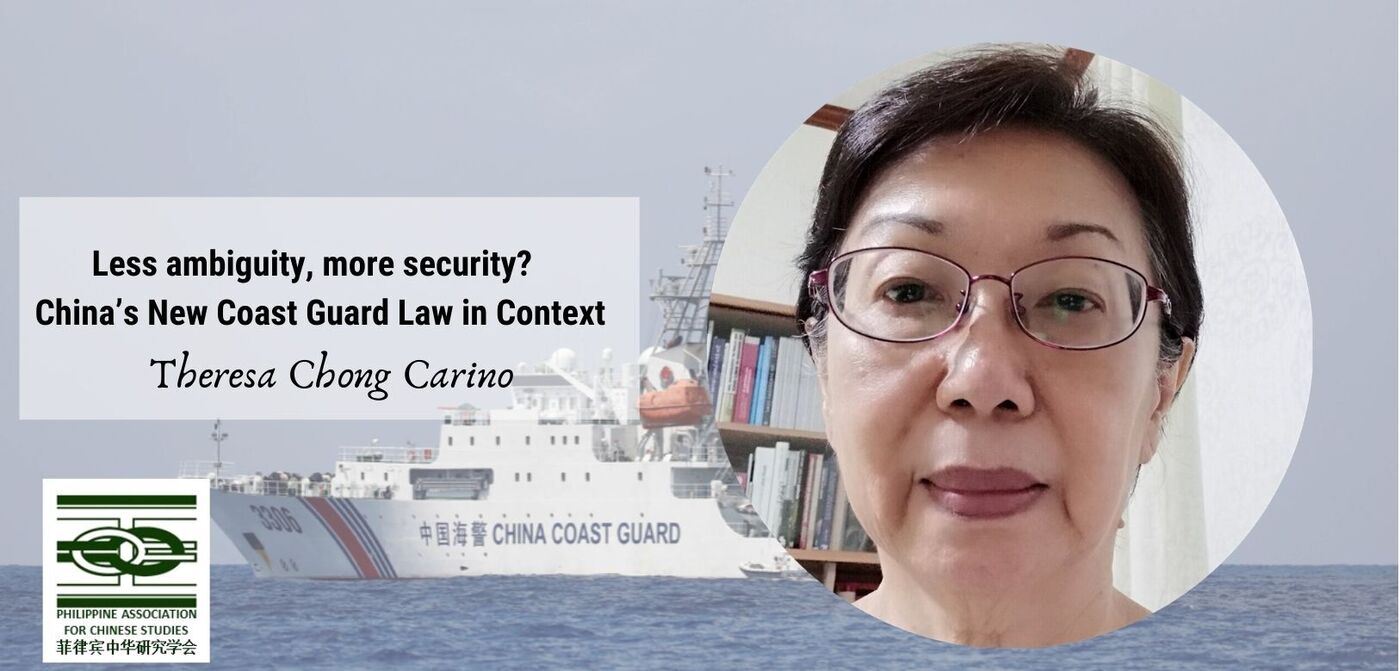by Theresa Carino
18 February 2021 – China’s New Coast Guard Law, which came into force on 1 February 2021, explicitly specifies for the first time the conditions under which the Chinese Coast Guard (CCG) would be allowed to use weapons against foreign vessels. What appeared as an effort to institutionalize a maritime law enforcement agency stirred concerns because of its possible implications to regional flashpoints like the South China Sea (SCS). Power asymmetry and growing great power rivalry make it imperative for Beijing to reassure its neighbors especially as the law entered into force.
Li Zhanshu, chairman of the National People’s Congress’ (NPC) Standing Committee, noted that the new coast guard law provides legal guarantees for effectively safeguarding China’s national sovereignty, security and maritime rights and interests. But China’s growing power projection and friction with the United States and the timing – coming as the world battles and tries to recover from a global pandemic – has made coastal neighbors uneasy. Former Philippine Supreme Court Associate Justice Antonio Carpio described the law as a “grave threat to world peace”. The move also drew sharp reaction from Japan, especially from the Liberal Democratic Party’s National Defense Division, which denounced the law as “blatantly threatening.” It was argued that a clause in the legislation would allow Beijing to forcibly demolish unapproved structures in waters and islands it claims.
While Tokyo also plans to expand its own coast guard patrols in the area, some lawmakers are calling for stronger action. “We may need something like the Territorial Security Act that the opposition submitted in the past,” said Masahisa Sato, head of the LDP’s Foreign Affairs Division and a former Ground Self-Defense Force official.
The timing of the legislation provides an opportunity for the Biden Administration to reassure Asian allies that it will put its weight behind security pacts Washington signed with them. US Secretary of State Antony Blinken has assured Japan that the Senkaku/Diaoyutai Islands fall under its Mutual Defense Treaty and has also very quickly informed Manila that the South China Sea falls under the geographic scope of the Philippines-US Mutual Defense Treaty.
Standardization of practice and operations
The Chinese government has argued that its New Coast Guard Law passed on 22 January 2021 by its legislature is just the culmination of years of effort toward clarifying and standardizing the operations of the CCG that was created in 2013 through the merger of four of its five major maritime law enforcement agencies: The China Marine Surveillance, Maritime Police, Fishery Law Enforcement and Anti-Smuggling police.
Prior to this, the primary law that had been used to standardize the use of force was the “Regulations of the People’s Republic of China on Use of Police Implements and Arms by the People’s Police,” which contained only generic provisions on the procedure of using weapons and had not been updated since its enactment in 1996. The “Regulations on Use of Weapons by the Border Control Forces” and its supplemental provisions, which used to provide a procedure of reviewing and approving the use of force, ceased to be in effect in 2014.
Thus, the passage of the law can be seen as a significant step by China towards institutionalizing its maritime law enforcement force and standardizing the operations of the CCG. The law mandates how the CCG would perform its duties at sea, such as patrolling Chinese-administered waters, reefs and islands (including artificial islands), cracking down on terrorist activities, investigating smuggling and other criminal acts, protecting the marine environment, and overseeing other vessels’ resource exploration, managing fishery activities, as well as carrying out search and rescue operations.
An article in the third chapter, under “Maritime Security,” allows the CCG to “take all necessary measures, including the use of weapons, when national sovereignty, sovereign rights, and jurisdiction are being illegally infringed upon by foreign organizations or individuals at sea.”
It is also stipulated that “aside from hand-held arms, the personnel of the coast guard can use ship borne or airborne weapons when they carry out anti-terrorist missions, deal with serious incidents of violence at sea, and when their vessels and/or aircrafts are attacked by weapons or other dangerous means.”
Under the new law, the CCG has the right to order foreign organizations and individuals to stop the construction of buildings, structures and deployment of floating devices in the waters and/or on islands of China. The law underscores, “For those who do not stop the illegal activities or refuse to make rectifications within a time limit, the coast guard may forcibly dismantle [buildings and structures] in accordance with law.”
The law seems to have empowered the CCG to take more forceful actions against what it deems as infringements on Chinese sovereignty. In areas of overlapping claims in the SCS, there are fears it could provide legal cover, for instance, for China’s efforts to expel Filipino fishermen from fishing in the Panatag (Scarborough) Shoal or to block Philippine-sanctioned foreign firms from exploring oil and gas in the West Philippine Sea. Even before the adoption of the law, incidents of harassment and intimidation of Filipino fishermen had already been reported. The law’s passage only serves to heighten, not dissipate, anxieties.
Militarization of ‘Coast Guards’ in Southeast Asia
Unfortunately, China’s new law follows a trend among Asian countries toward authorizing maritime law enforcement personnel to use force on foreign vessels. For example, Japan revised its Coast Guard Law in 2001, authorizing its personnel to use weapons against foreign vessels within Japanese waters in situations deemed as reasonable and necessary. South Korea authorized its coast guard officers in 2016 to use firearms including handguns and onboard cannons against Chinese fishing vessels operating illegally in Korean waters should the situation be deemed threatening.
Likewise, Vietnam’s new coast guard law of 2018, grants its maritime law enforcement personnel greater latitude to open fire at sea. The Vietnam Coast Guard (VCG) would be able to open fire to “protect sovereignty and sovereign rights in defense and security situations,” including opening fire to warn ships operating illegally in Vietnam’s waters if they do not halt illegal activities.
It could be argued that the growth and “militarization” of ‘Coast Guards’ in Southeast Asia is a relatively new phenomenon and is partially a response to a wide spectrum of non-traditional maritime-related threats such as arms and drug smuggling, human trafficking, piracy, illegal fishing, and militancy, not to mention marine environment degradation and natural disasters. However, increasing the use of force also raises the risk of unintended encounters and incidents in the SCS, especially in areas of overlapping sovereignty claims.
China should assuage fears in Southeast Asia
Perhaps the fear of China and its future intentions does not arise from the fact that it has a new Coast Guard Law but rather from the asymmetry in maritime capabilities between China and other claimants to parts of the South China Sea.
There is much that China can and must do to assuage regional unease over its new coast guard law. It can demonstrate greater political will to engage other regional maritime law enforcement agencies to minimize the risk of incidents at sea. It is an encouraging sign, for instance, that Clause 64 of China’s coast guard law specifies managing and controlling maritime crises, among others, as a primary international cooperation task for the CCG.
Maritime areas governed by China and the rights within these areas should be clarified. Meanwhile, the rights enjoyed by other countries should be acknowledged so as to show that China is willing to accept its international legal obligations. In addition, the principle of sustainable development should be specified regarding the exploration and exploitation of both living and mineral resources.
Urgent need for dialogue and confidence-building measures
There is an urgent need for serious exploration of cooperative measures and dialogues on maritime security. It should be recalled that in November 2014, China and the United States entered into a Memorandum of Understanding (MOU). While not legally binding, it was an effort to strengthen adherence to existing international law; to improve operational safety at sea and in the air; to enhance mutual trust; and to develop a new model of military-to-military relations between the United States and China. The MOU sought to avert incidents and build trust between United States and Chinese surface vessels by reiterating the requirements of international law. If it was not implemented during the Trump administration, hopefully, it could be reactivated under Biden’s leadership.
Coast guard cooperation has been seen as a confidence-building measure within the United Nations (UN) and the Conference on Security and Cooperation in Europe (CSCE). It has been employed by countries like Japan, the United States and the Philippines in limited ways. Given the major power rivalry between the US and China, there would be limits to its effectiveness unless there was agreement by the two major powers on how this can be implemented by countries in the region, including in hotspots like the South China Sea (SCS).
Recent studies have shown that a four-tier layered model of maritime dispute management is needed to promote cooperation and peacefully manage conflicts in SCS: 1) marine environmental security as a driving force for cooperation; 2) fisheries cooperation as a practical area to commence dispute resolution; 3) application of the United Nations Convention on the Law of the Seas (UNCLOS) as a framework for ocean governance; and lastly, but most importantly, 4) a change of mindsets on policy and research direction among key regional actors and major powers. Progress on the four initiatives will be no easy feat and may take time, but it may help parties focus on the big picture, take the long view and avoid over reading new developments.





